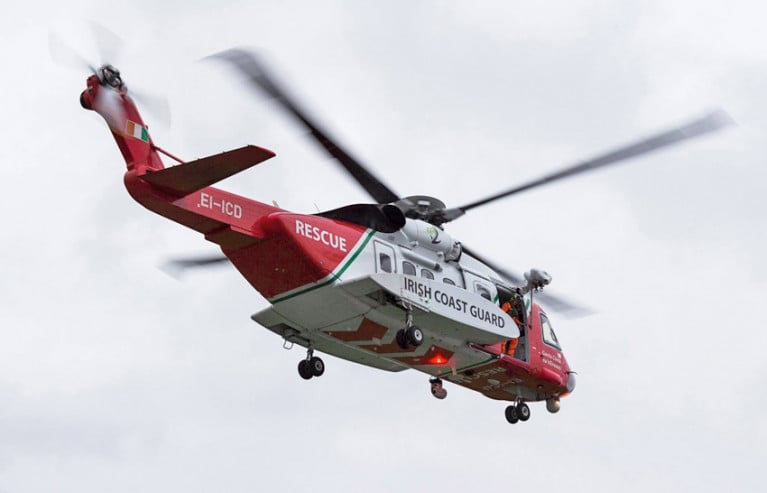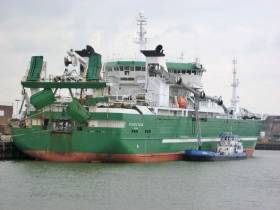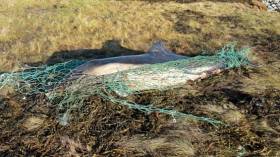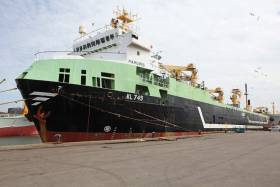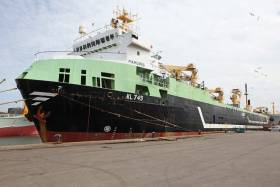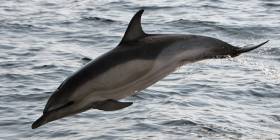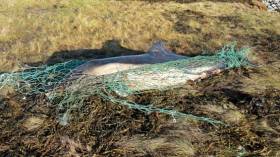Displaying items by tag: Supertrawler
Fishers in Ireland and conservation groups are keeping a close eye on the supertrawler Margiris, which is currently fishing off Ireland’s West Coast.
According to GalwayBeo, the controversial factory ship has been labelled a “vacuum cleaner of the sea” for its ability to catch and freeze as much as 250 tonnes of fish every day.
It’s also been implicated in discarding huge quantities of bycatch — a practice banned in the European Union.
But the Dutch company that operates the vessel claims its fishing methods are less damaging to the marine environment than regular trawling and that it has “excellent reputation for sustainable fishing”.
GalwayBeo has more on the story HERE.
Controversial Supertrawler Tracked Off Mayo Coast After Shedding More Than 100,000 Dead Fish in French Waters
A supertrawler implicated in the discarding of more 100,000 dead fish off the coast of France has been tracked to waters off Co Mayo, as Independent.ie reports.
Maritime campaigners filmed the release of blue whiting from the FV Margiris in the Bay of Biscay earlier this month — an incident the trawler’s owner said was “involuntary”, blaming a ruptured net.
But environmental activists Sea Shepherd claim the incident is an example of discarding bycatch, a practice explicitly banned in the European Union.
The FV Margiris, which was previously barred from fishing in Australia, has sparked controversy in Irish waters before.
In December 2016 the world’s second-largest factory-freezer vessel was boarded off the North West coast by Naval Service personnel following concerns among the trawler fleet fishing out of Killybegs.
Independent.ie has more on the current story HERE.
The Irish Coast Guard’s Shannon-based helicopter launched to rescue two seriously injured crew from a Dutch supertrawler on Friday morning (6 March), as the Irish Examiner reports.
Rescue 115 was dispatched yesterday to the Zeeland, a 6,000-tonne fishing factory, following the incident overnight some 170 nautical miles west of Loop Head.
With winds reaching storm Force 8 at sea, the decision was made to bring the Zeeland closer to the Shannon Estuary to allow the coastguard helicopter to approach in improved weather conditions.
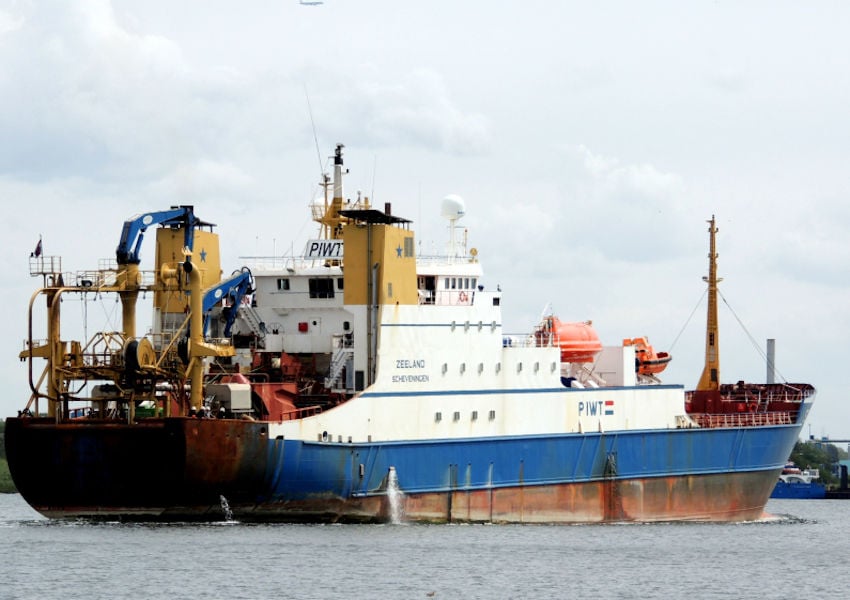 The Zeeland pictured in the Netherlands in 2015 | Photo: Moolen/Shipspotting
The Zeeland pictured in the Netherlands in 2015 | Photo: Moolen/Shipspotting
Both injured crew were assessed and treated on the vessel before being airlifted to University Hospital Limerick. Their condition is not known at this time.
The Irish Examiner has more on the story HERE.
#Fishing - Trawling by fishing vessels over 18 metres will be banned within Ireland’s six-mile limit from 1 January 2020, the Government has announced.
Marine Minister Michael Creed yesterday (Friday 21 December) revealed his decision following a review conducted earlier this year of so-called ‘supertrawler’ activity within Ireland’s inshore waters.
An extensive public consultation from 30 April until 11 June attracted over 900 submissions, with a wide diversity of views expressed.
After considering the issues raised therein, and following what the department called a “detailed evaluation”, Minister Creed said he believes “there is a compelling case for excluding trawling by large vessels in coastal waters inside six nautical miles.
“I am satisfied that there are sufficient fishing opportunities for these vessels outside of six nautical miles. I also believe that these actions will provide wider ecosystem benefits, including for nursery areas and juvenile fish stocks.
“I am very conscious of the exclusive reliance of small-scale and island fishermen on inshore waters and the benefits this change will bring for those fishermen. I firmly believe that this will, in the medium term, provide ecosystem and nursery stock benefits for all fishermen.”
The minister added: “I am mindful of the opportunity these measures will provide for further sustainable development of the small-scale inshore and the sea angling sectors, which the Government has committed to in the Programme for a Partnership Government.”
Minister Creed further announced that there will be a transition period of three years for vessels over 18m targeting sprat. This is in order to allow a period of adjustment for these vessels, as this fishery is concentrated inside the six-nautical-mile zone.
“I recognise that effective change needs time,” the minister said. “I have had an extensive and prolonged consultation to flag consideration of change.
“Allowing a transition period for those vessels involved in the sprat fishery will ensure that the vessels have adequate time to transition to other fishing activities. I am asking BIM to offer affected vessel owners technical assistance to adjust to other fisheries during the transition process.”
Vessels over 18m will continue to be permitted inside six nautical miles to trawl for sprat only until 2022. A total allowable catch of up to 2,000 tonnes, reflecting a reduction on recent years, will be permitted for these vessels during 2020, reducing to 1,000 tonnes in 2021. All trawling activity by over 18m vessels for sprat, inside the six-mile limit, will end from the beginning of 2022.
The news follows Ireland’s securing of €260 million in fish quotas for 2019, the year that sees the full implementation of the discards ban. Mackerel fishermen, however, will see their quota cut by one fifth for the coming 12 months.
Challenge To Atlantic Dawn’s Influence Over Irish Fishing Fleet
#Fishing - Fishing rights retained in the sale of Irish supertrawler Atlantic Dawn could continue to net many millions of euro for its former owners — much to the ire of smaller operators in Ireland’s fishing fleet, as The Irish Times reports.
Despite being built to fish international waters, the Atlantic Dawn was entitled to a significant “fishing asset”, comprising tonnage, engine power and quota rights under EU rules, due to being flagged as Irish.
Though the ship in question was sold to Dutch owners in 2007, the Atlantic Dawn Group kept its asset — leading to a market standing that opponents say has strengthened disproportionately to the rest of the Irish fleet after the Common Fisheries Policy imposed limits on vessel expansion in 2003.
Now a number of vessels in the pelagic and whitefish sectors are seeking compensation from Brussels as a result of the Killybegs-based company’s extraordinary but entirely legal position.
The Irish Times has much more on the story HERE.
MEP Wants European Level Probe Into Alleged Supertrawler Link With Dolphin Deaths
#Supertrawler - An MEP for Ireland South is calling on the European Commission to investigate an alleged connection between ‘supertrawler’ activity and a spike in dolphin standings earlier this year.
As the West Cork Times reports, Fine Gael’s Deirdre Clune MEP has submitted a parliamentary question that makes reference to the unusually high rate of standings recorded by the Irish Whale and Dolphin Group (IWDG) in the first three months of 2016.
“The allegation is that the spike in dolphin deaths is as a direct result of a busy and sustained period of supertrawler activity in our waters,” says Clune, who adds that the Commission “now has a duty of care under the Habitats Directive to investigate this matter to establish the facts.”
Such concerns were renewed in recent weeks after the controversial super-sized trawler Margiris was spotted fishing off the North West coast.
Last week the vessel, one of the largest of its kind on the seas, was boarded for inspection by Naval Service personnel — as the Irish Wildlife Trust reiterated its calls for a full-time inspection regime for large-scale factory trawlers to ensure compliance with the Common Fisheries Policy and environmental protections.
Supertrawler Boarded For Inspection Off Donegal
#Supertrawler - Naval Service personnel from the LÉ James Joyce have boarded a controversial fishing ‘supertrawler’ off the North West coast, according to the Donegal Democrat.
As previously reported on Afloat.ie, the 9,500-tonne FV Margiris — one of the largest fishing vessels in the world — prompted renewed fears among local fisherman and conservationists last week when it was spotted in fishing grounds off Donegal.
News of the Naval Service inspection has been welcomed by the Irish Wildlife Trust, though it cautioned on the need for a full-time inspection regime for such large-scale factory trawlers to ensure they are fishing legally and within quota, and not causing harm to protected wildlife such as dolphins.
The Donegal Democrat has more on the story HERE.
Supertrawler ‘Margiris’ Returns To Fish In Irish Waters
#Supertrawler - The controversial supertrawler Margiris has returned to fish in Irish waters, as Coast Monkey reports.
Previously banned from Australian waters, the 9,500-tonne FV Margiris is one of the largest fishing trawlers on the seas, and has previously fished off Ireland with a quota under the Common Fisheries Policy.
That hasn’t assuaged concerns among the Irish fishing fleet, nor conservationists who fear a connection between the activities of large-scale ‘floating factory’ type fishing vessels and rising numbers of dolphin strandings in the North West.
This past September, MEP Sean Kelly called for regular on-board inspections of supertrawlers fishing in Irish waters to ensure they are sticking to CFP regulations.
The FV Margiris’s latest position can be tracked via Marine Traffic HERE.
'Maximise Supertrawler Inspections After Dolphin Deaths': MEP Urges Increased Action Along Irish Coast
Seán Kelly MEP (Ireland South) is calling for regular on-board inspections of supertrawlers fishing off the Irish coast to ensure that they are fully compliant with the EU Common Fisheries Policy, following a reported rise in dolphin deaths. The Fine Gael MEP is also asking the Sea-Fisheries Protection Authority (SFPA) to review and maximise its inspections when trawlers are operating off the Irish coast.
“In July 2016, in separate cases, three dead dolphins were found on the south-west coast of Ireland in the space of one week, one with a rope around its tail. These findings follow reports of a rise in the number of dead dolphins on Ireland’s west coast since the beginning of 2016.
“It is reported that large supertrawlers are currently operating around 30km off the coast of Co Kerry. While the link between supertrawler activity and the increase in these dolphin deaths is not proven, the Common Fisheries Policy (CFP) stresses that caution must be taken as regards the impact of human activity on all components of the ecosystem,” Mr Kelly stressed in an official question to the European Commission on the matter.
In a response received by Mr Kelly this week, the Commission said it “takes note of the recent death of dolphins along the south-west coast of Ireland” and that it “has tabled a revised technical measures proposal which aims to ensure better protection of cetaceans and alignment of by-catch levels to international levels. This proposal is currently being discussed by the co-legislators”.
Speaking from Brussels today (Wednesday), Mr Kelly said: “I welcome that the Commission is monitoring the situation. The Sea-Fisheries Protection Authority (SFPA) is responsible for yearly reports to the Commission, but in light of these recent reports, I am urging the SFPA to maximise inspections along the Irish coast.”
In the written response, the Commission added: “When trawlers are fishing off the Irish coast, the SFPA has access to satellite Vessel Monitoring, Automatic Identification System (AIS) and Electronic Reporting Systems (ERS) data. Regular inspections are organised at sea and at landing by the SFPA, to check compliance with the Common Fisheries Policy. The SFPA regularly reports on its control and inspection activities.”
The Commission also confirmed that it is carrying out regular audits in Ireland to ensure that Ireland is complying with its obligations and has an effective monitoring, control and surveillance system in place.
Ireland became the first European country to declare all Irish waters a dolphin and whale sanctuary in 1991.
#MarineWildlife - Strandings of common dolphins for the first two months of the year are at their second highest since records began in 2002, says the Irish Whale and Dolphin Group (IWDG).
A total of 28 confirmed standings were recorded in the IWDG's strandings database in January and February of this year, just below 2013's worst figures so far when 31 were reported.
That compares to an average of fewer than six reports for the same period each year between 2002 and 2010.
The current decade has seen a significant jump in recorded figures, with 18 reports of dolphin standings in 2011 compared to just two in the same months in 2010.
Many of the dolphins found this year were recorded in the North West, a great number of them drowned according to post-mortem results, while others showed signs of being tangled in fishing gear, which suggests they were bycatch in the nets of supertrawlers that ply the seas off Donegal, Sligo and Mayo.
"While there is no conclusive proof of what vessels are involved, the evidence points to the presence of large (c.100m) foreign registered freezer trawlers fishing in Irish offshore waters."
That's according to the IWDG's strandings officer Mick O'Connell, who warns that "the number of bycaught dolphins that actually get washed ashore and recorded as stranded may be only a small percentage of the actual number of dead animals."
The IWDG reiterates the call for independent observers to be placed on supertrawlers in Irish waters, following controversy over the visit of one of the world's largest fishing boats last November.
In other news, Scotland's Press and Journal reports that a humpback whale was killed after getting trapped in fishing ropes in the Outer Hebrides.
The juvenile whale was found dead on the Isle of Barra this week with the "classic signs of having suffered entanglement."




























